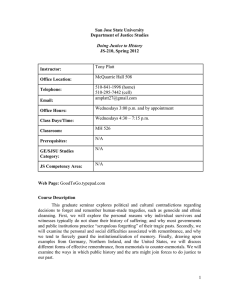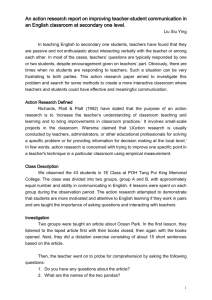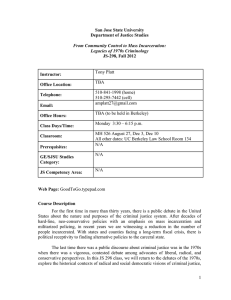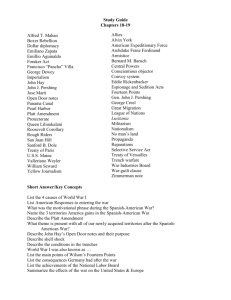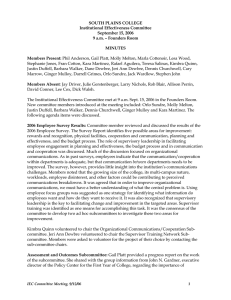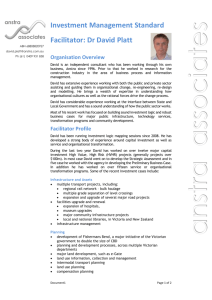San Jose State University Department of Justice Studies JS-288, Spring 2013
advertisement
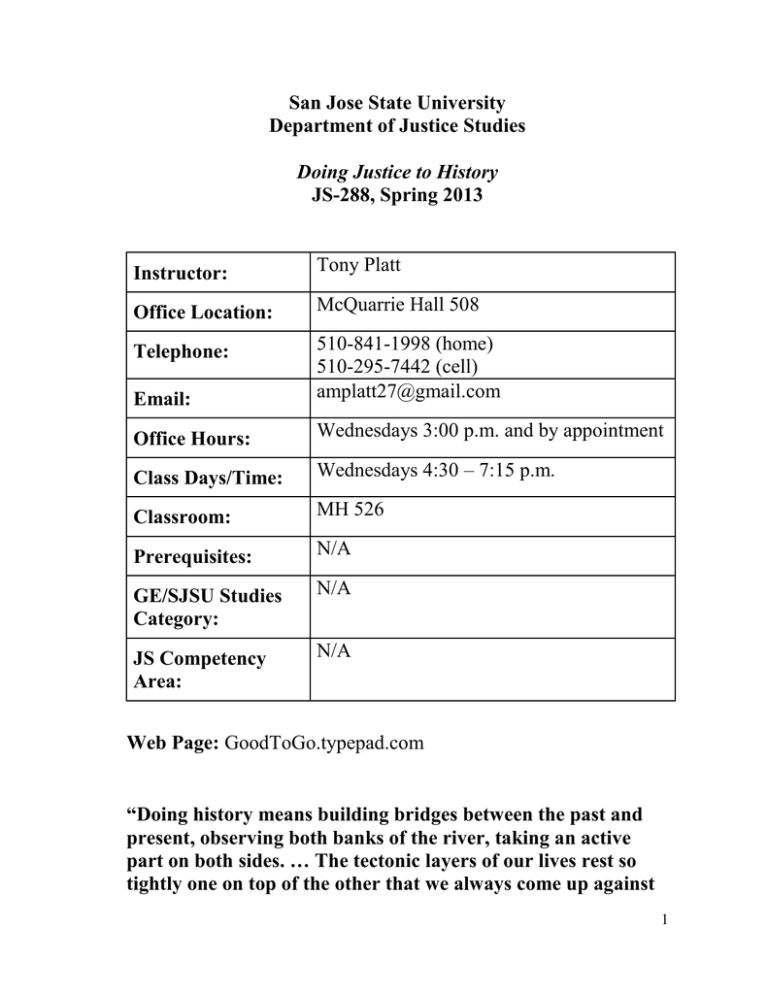
San Jose State University Department of Justice Studies Doing Justice to History JS-288, Spring 2013 Instructor: Tony Platt Office Location: McQuarrie Hall 508 Telephone: Email: 510-841-1998 (home) 510-295-7442 (cell) amplatt27@gmail.com Office Hours: Wednesdays 3:00 p.m. and by appointment Class Days/Time: Wednesdays 4:30 – 7:15 p.m. Classroom: MH 526 Prerequisites: N/A GE/SJSU Studies Category: N/A JS Competency Area: N/A Web Page: GoodToGo.typepad.com “Doing history means building bridges between the past and present, observing both banks of the river, taking an active part on both sides. … The tectonic layers of our lives rest so tightly one on top of the other that we always come up against 1 earlier events in later ones, not as matter that has been fully formed and pushed aside, but absolutely present and alive.” Bernhard Schlink, The Reader (1995) Course Description This graduate seminar explores political and cultural contradictions regarding decisions to forget and remember humanmade tragedies, such as genocide and ethnic cleansing. First, we will explore the personal reasons why individual survivors and witnesses typically do not share their history of suffering; and why most governments and public institutions practice “scrupulous forgetting” of their tragic pasts. Secondly, we will examine the personal and social difficulties associated with remembrance, and why we tend to fiercely guard the institutionalization of memory. Finally, drawing upon examples from Germany, Northern Ireland, and the United States, we will discuss different forms of effective remembrance, from memorials to counter-memorials. We will examine the ways in which public history and the arts might join forces to do justice to our past. The seminar will focus on how these issues are dealt with in California. The state has a long history of socially created tragedies – such as genocide of northwest tribal communities, trading in native women and children, looting of native gravesites, lynching of Mexicans during the Gold Rush, ethnic cleansing of Chinese immigrants in the late 19th century, compulsory sterilization and educational segregation in the name of eugenics between the world wars, unconstitutional imprisonment of Japanese Americans during World War II, and racially disproportionate imprisonment throughout 20th century – but has done very little to publicize and commemorate these significant events in California’s history. Why is this case? What events are worthy of public remembrance? And how should they be remembered? 2 Students are expected to participate in a discussion of these issues, write one reaction paper, carry out a research project that identifies a subject matter in need of public remembrance, and develop a specific proposal for its commemoration. About the Instructor Tony Platt is the author of ten books and 150 essays and articles dealing with issues of race, inequality, and social justice in American history. Platt taught at the University of Chicago, University of California (Berkeley), and California State University (Sacramento). In 2012, he is a Visiting Professor in Department of Justice Studies, San José State University. His publications have been translated into German, Spanish, Italian, and Japanese. His latest book – Grave Matters: Excavating California’s Buried Past – was recently published by Heyday. He lives in Berkeley and Big Lagoon, California, and serves as secretary of the Coalition to Protect Yurok Cultural Legacies at Opyuweg (Big Lagoon). He can be reached at 510-841-1998 or amplatt27@gmail.com. He blogs on history and memory at http://GoodToGo.typepad.com. Learning Objectives The class has the following learning objectives: (1) (2) (3) (4) To appreciate the significance of a historical perspective for justice studies. To develop the ability to analyze and evaluate historical evidence. To understand the importance of remembrance and commemoration in public history. To express an informed point of view about controversial historical issues. 3 (5) (6) To do in depth research on a topic relating to public commemoration. To develop an ability to apply historical knowledge to contemporary situations. Office Hours Office hours will be held as needed on Wednesdays prior to class. Make appointment with instructor by e-mail or in class. Best way to reach Tony Platt is by e-mail (amplatt27@gmail.com). Expectations That you attend all classes and actively participate in discussions. That you come to class prepared, having done required readings. That you inform Tony Platt if you are unable to attend class and propose how to make up the missed class. That you fully engage issues in the class and complete work on schedule. That you speak your mind, raise concerns if there are problems in the class, and be respectful to your colleagues. That you take pride in your work and be open to new ideas. Grading To receive a “B,” you are expected to meet basic requirements of the class: Come to class prepared, actively participate in discussions, lead a presentation on the readings, complete written assignments, submit a project proposal (either as individual or group), present your project orally to class, and submit a final project in writing. If you are not meeting these basic requirements, I will ask to meet with you and discuss how to improve your work. 4 To receive an “A,” you must meet all basic requirements, plus do outstanding work in your written assignments, plus at least one other area – class participation or class presentations or group or individual project. Assignment #1 This semester-long project involves (i) historical research on a significant, human-made (as opposed to natural) tragedy involving fundamental violations of human rights; and (ii) a proposal to commemorate and remember what happened. You can do this project by yourself or with a partner. Details of this project will be discussed in class. You are expected to submit a written precis of your project by March 6th; report to the class about your progress and problems; present your project to the class close to the end of the semester; and complete a written, documented paper (no longer than twenty pages) by date to be announced. Assignment #2 Visit the statue of Tommie Smith and John Carlos on the SJSU campus. The statue commemorates their protest at the 1968 Olympics in Mexico City. Are you moved/engaged by the commemoration? Does the statue do justice to their protest? Does the statue educate people on campus about the historical significance of what happened in 1968? What do you think about the design and aesthetics of the commemoration? Anything you would change or do differently if you could design this commemoration? Assignment due February 6th, no longer than five pages. Texts/Readings 5 BOOKS REQUIRED Tony Platt, Grave Matters: Excavating California’s Buried Past. Heyday, 2011. Jean Pfaelzer, Driven Out: The Forgotten War Against Chinese Americans. University of California Press, 2008. ARTICLES REQUIRED (in reader) Available from Tony Platt at cost of reproduction. Dave Zirin, “When Fists Are Frozen: The Statue of Tommie Smith and John Carlos,” CommonDreams.org, 20 October 2005. Janna Thompson, Taking Responsibility for the Past: Reparation and Historical Injustice. Polity, 2002, pp. vii-xxi. Tony Platt, “Racism Remembered and Forgotten: From Nuremberg to California,” Transit Nuernberg, March 2007. Tony Platt, “Curious Historical Bedfellows: Sac State and its Racist Benefactor,” Sacramento Bee, February 29, 2004. Tony Platt and Alexandra Stern, “Shared Riches Bring Wealth of Baggage,” San Francisco Chronicle, June 10, 2007. Timothy Ash, “The Freedom of Historical Debate is Under Attack by the Memory Police,” The Guardian, October 16, 2008. Christopher Heinrich, “No Place for a Wreath,” in Renata Stih and Frieder Schnock, Berlin Messages, catalogue published by Museum of Art, Fort Lauderdale, 2005. Tony Platt, “Northern Ireland’s Past Has a Future,” Los Angeles Times, May 9, 2007. Ira Berlin, “Coming to Terms With Slavery in Twenty-FirstCentury America,” in James Oliver Horton and Lois E. Horton (eds.), Slavery and Public History: The Tough Stuff of American Memory, The Free Press, 2006. John Michael Vlach, “The Last Great Taboo Subject: Exhibiting Slavery at the Library of Congress,” in Horton & Horton. 6 Marie Tyler-McGraw, “Southern Comfort Levels: Race, Heritage Tourism, and the Civil War in Richmond,” in Horton & Horton. Dwight T. Pitcaithley, “’A Cosmic Threat’: The National Park Service Addresses the Causes of the American Civil War,” in Horton & Horton. Edward T. Linenthal, “Epilogue: Reflections,” in Horton & Horton. Bishop Francis A. Quinn, “The Church Apologizes….”, speech at 190th Anniversary of San Rafael Mission,” 15 December 2007. Tony Platt, “The Yokayo vs. The University of California: An Untold Story of Repatriation,” News from Native California, Vol 26, No. 2, Winter 2012-2013, 9-14. Barbara Takei and Judy Tachibana, Tule Lake Revisited: A Brief History and Guide to the Tule Lake Concentration Camp Site. San Francisco: Tule Lake Committee, 2012, pp. 1-21, 27-29. BLOGS The following blogs are available on Tony Platt’s website: http://GoodToGo.typepad.com “For All of Us” “The Shame of California” “Memento Mori” “Facing The Past” “Bombs Away” “The Disappeared” “Sightlines” “California Dreamin’” “Death’s Double Standard” “I Am Here For Our History” “The Result Would Have Been The Same” 7 CALENDAR 1. January 23 Overview, Introductions, Goals Expectations, process, assignments Assignment #1: Paper due at end of semester Assignment #2: Making History at SJSU 2. January 30 History and Memory Readings: Zirin, “When Fists Are Frozen”; Platt, “Racism Remembered and Forgotten”; Janna Thompson, “History and Responsibility”; Platt blog, “Sightlines.” Sign up for leading discussion of readings 3. February 6 Genocide in California? Readings: Platt, Grave Matters, chapters 1-3; Platt blog, “California Dreamin’.” Assignment #2 due. 4. February 13 Grave Looting Readings: Platt, Grave Matters, chapters 4-9; Platt blogs, “Death’s Double Standard,” “I Am Here For Our History,” “The Result Would Have Been The Same.” 5. February 20 Anti-Asian Racism Readings: Pfaelzer, Driven Out, chapters Introduction-5 6. February 27 Anti-Asian Racism Brainstorm projects 8 Readings: Pfaelzer, Driven Out, chapters 6-Conclusion; Takei and Tachibana, Tule Lake Revisited, 1-21. 7. March 6 Slavery, Eugenics, Imprisonment Assignment #1 three-page proposal due (hard copy and email) Readings: Berlin, “Coming to Terms with Slavery”; Platt, “Curious Historical Bedfellows”; Platt and Stern, “Shared Riches”; Platt blog, “The Shame of California.” Two-page proposal for Assignment #1 due. 8. March 13 Facing The Past Readings: Readings: Ash, “The Freedom of Historical Debate”; Heinrich, “No Place for a Wreath”; Platt, “Northern Ireland’s Past”; Platt blogs, “Memento Mori,” “Facing The Past,” “Bombs Away,” “The Disappeared,” and “For All of Us.” 9. March 20 Research Project No class, time to do research on project Report problems by email March 27 No class/Spring break 10. April 3 Remembrance Readings: Vlach, “The Last Great Taboo Subject”; TylerMcGraw, “Southern Comfort Levels”; Pitcaithley, “ A Cosmic Threat”; Linenthal, “Epilogue: Reflections”; Takei and Tachibana, Tule Lake Revisited, 27-29. 9 Progress reports on projects. Discussion and problemsolving. 11. April 10 Review of course themes and issues Discussion of research projects 12. April 17 PRESENTATIONS Presentations to class. Feedback and discussion. 13. April 24 PRESENTATIONS Presentations to class. Feedback and discussion. 14. May 1 PRESENTATIONS Presentations to class. Feedback and discussion. 15. May 8 PRESENTATIONS & SUM UP Presentations to class. Feedback and discussion. Sum up and evaluation of class. Deadline for Assignment #1 (by email and postal mail) TBA. DROPPING & ADDING Students are responsible for understanding the policies and procedures about add/drops, academic renewal, etc. Information on add/drops are available at http://www.sjsu.edu/advising/faq/index.htm#add. Information about late drop is available at 10 http://www.sjsu.edu/aars/policies/latedrops/. Students should be aware of the current deadlines and penalties for adding and dropping classes. University Policies Academic integrity Students should know the University’s Student Conduct Code, available at http://www.sjsu.edu/studentconduct/docs/Student_Conduct_Code. pdf. Your own commitment to learning, as evidenced by your enrollment at San Jose State University and the University’s integrity policy, require you to be honest in all your academic course work. Faculty members are required to report all infractions to the office of Student Conduct and Ethical Development, found at http://www.sjsu.edu/studentconduct. Instances of academic dishonesty will not be tolerated. Cheating on exams or plagiarism (presenting the work of another as your own, or the use of another person’s ideas without giving proper credit) will result in a failing grade and sanctions by the University. For this class, all assignments are to be completed by the individual student unless otherwise specified. If you would like to include in your assignment any material you have submitted, or plan to submit for another class, please note that SJSU’s Academic Policy F06-1 requires approval of instructors. Campus Policy in Compliance with the American Disabilities Act If you need course adaptations or accommodations because of a disability, or if you need to make special arrangements in case the building must be evacuated, please make an appointment with me as soon as possible, or see me during office hours. Presidential Directive 97-03 requires that students with disabilities requesting accommodations must register with the DRC (Disability Resource Center) to establish a record of their disability. 11 12
